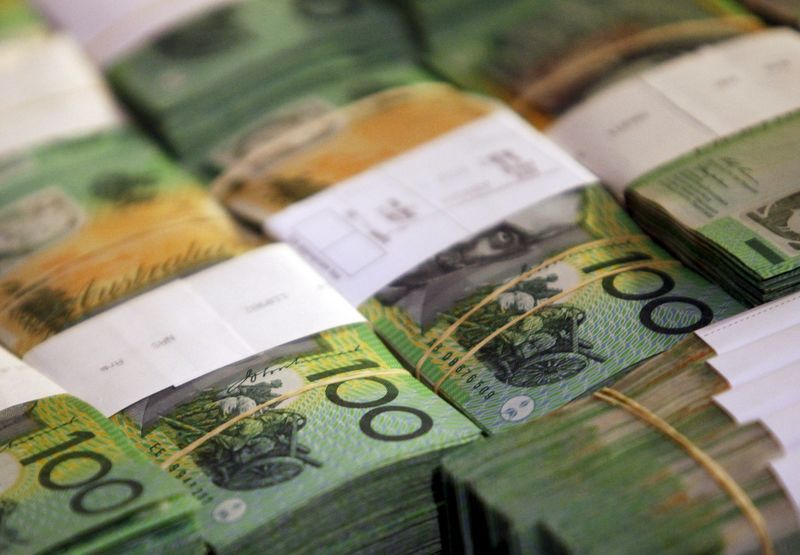By Wayne Cole
SYDNEY, May 29 (Reuters) - The Australian and New Zealand dollars were stuck on the sidelines on Wednesday while government bonds took the starring role as mounting concerns about global growth drove yields to all-time lows.
The Aussie AUD=D3 was holding tight at $0.6924 having spent three sessions in a snug $0.6913/6941 range. Strong support lies at the recent five-month trough of $0.6865, with resistance at $0.6960.
The kiwi dollar NZD=D3 was equally calm at $0.6542, having spent the week so far between $0.6540 and $0.6559. The key level for bears is the seven-month trough at $0.6482.
The bull run for bonds was timely for Australia's government as it sold A$3 billion in a new 2031 line that offered a record-low coupon of just 1.5% - equal to the overnight cash rate.
The sale drew a hefty A$10.7 billion in bids to yield 1.6%, 65 basis points less than the equivalent U.S. note. Yields on three-year paper AU3YT=RR hit an historic low of 1.082%, while futures firmed to 98.915 YTTc1 .
Bonds everywhere have been boosted by a run of soft global economic data and worries the Sino-U.S. trade dispute could last for years, and spread to other nations.
The local market gained added impetus from the prospect of cuts in official rates as economic growth and inflation sorely disappointed. The Reserve Bank of Australia (RBA) is considered almost certain to ease by a quarter point to 1.25% at a policy meeting next week.
Futures 0#YIB: have fully priced in a further move to 1% by September at the latest, and imply a 64% chance of reaching 0.75% by February next year.
Gross domestic product data for the March quarter due out next week is expected to justify that dovish outlook with annual economic growth seen slowing to just 1.8% or less, levels last seen during the global financial crisis.
The only glint of light has been signs of a pick up in home loan demand and house prices since the conservative government won re-election on May 18. cannot ignore the growing body of anecdotes of a post-election bounce activity such housing foot traffic/auction clearance rates and weekly consumer confidence surging to above average levels," said Annette Beacher, chief Asia-Pacific macro strategist at TD Securities.
"We favour a short pause at 1.25% for the RBA to not only assess the impact of a June cut, but determine exactly what fiscal stimulus is coming down the pipe and what impact this could have on the economic outlook."
The government has already committed to a modest tax rebate from July 1, while the RBA itself has called for more public spending on infrastructure to support activity.
The Reserve Bank of New Zealand (RBNZ) has already cut its rates to 1.5% and markets are pricing in at least one more easing in coming months.
The central bank issued its latest assessment of the financial system on Wednesday and noted some of the risks around household debt had abated, though levels were still very high. (Editing by Sam Holmes)
